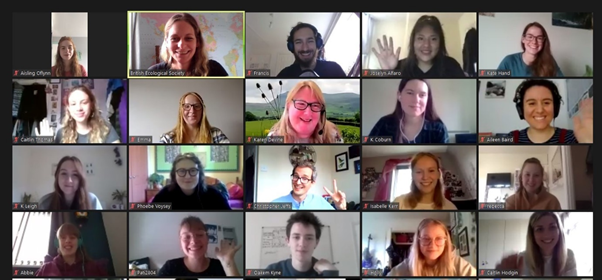Looking back at the BES Summer School – by Libby Brooks and Eilish Halford
The British Ecological Society (BES) Undergraduate Summer School is a funded week-long school for undergraduate students in their 1st or 2nd year studying a degree related to ecological science at a UK or Irish University. The programme covers practical skills in ecology, careers workshops and a wide range of ecological topics. The BES is passionate about diversifying the community of both academic and professional ecologists and enlists volunteers from the public and private sector to support this. Arcadis has been supporting the summer schools over the years, although this year was a bit different.

Eilish – Over the summer and in the midst of Lockdown 1.0, myself and my teammate at Arcadis, Libby, were delighted to deliver a session with support from CIEEM for the British Ecological Society (BES) Summer School. The Summer School is an opportunity for undergraduate students to undertake a week of seminars and workshops aimed at immersing them in the world of ecology, combining practical skills and an introduction to careers whilst covering a breadth of ecological topics. The 2020 Summer School would ordinarily have been held at Malham Tarn (bringing back uni trip memories for many North West-based ecologists I’m sure), however as with most in-person events this year it had been changed to a virtual event.
Libby – The theme of the session was ‘Careers in Consultancy’ in order to explore one of the career options for aspiring ecologists and the myriad pathways to reach the role right for them. While preparing, it offered an opportunity to reflect on our own differing routes into consultancy, which were not always as straightforward as anticipated; we both completed BSc degrees but in different subjects and contributed to ongoing research through our dissertations (Project Splatter, Operation Wallacea), however after graduating the options for ecologists were not always clear.
Eilish – I was able to undertake a short work placement with a globally recognised consultancy firm, but this was my first introduction to the possibility of ecological consultancy as a career. What followed was a combination of full-time retail work, gaining survey experience, full-time work at an independent consultancy, before taking on a consultant role at Arcadis. This has also given me the opportunity to work as a sustainability ambassador, demonstrating the diverse range of options available and the ability to link ecological consultancy with other environmental aspects.
Libby – Prior to my degree I had been volunteering for many years with a local wildlife and conservation society. I studied a degree in Biology and later specialised into ecology as my passion grew for the modules involving wildlife and conservation. During my degree I was able to undertake a professional training year with Eco-explore. The year comprised mainly scientific research, field-based survey work, data analysis and statistics, and was when I identified the possibility of consultancy as a career choice. After finishing my degree, I was lucky enough to start a seasonal ecology position with Arcadis and then was taken on as a graduate consultant.
Eilish – We discussed with the students the opportunities to stand out from the crowd on job applications and to build on the key transferable skills developed during their degrees, as well as following their own interests within ecology through volunteering. We also emphasised the importance of particular qualities/skills such as a having a clean driving license and considering the process towards CIEEM membership.
Libby – Attempting to describe a ‘typical’ week in ecological consultancy made us both appreciate the variety of the industry, as well as an understanding that it is not an easy role to sum up in a couple of words. As a general consensus there was more interest in site work as expected. Encouragingly however, most students already had an awareness of Biodiversity Net Gain. It was understood that now, more than ever, ecology and ecologists have the potential to advise and direct the country’s approach to biodiversity through Biodiversity Net Gain and Natural Capital on a wider strategic scale in addition to valuable site work.
Eilish – We made our session as interactive as possible, to make up for the lack of physical presence but also because I recall being at that career stage and having so many questions. The students engaged with our planned group activity introducing them to identifying ecological constraints through a desk-based exercise, giving them an idea of all the aspects we would consider for a client when initially dealing with a preliminary ecological appraisal. The responses from the students demonstrated an understanding of habitats and some knowledge of species legislation, which was really positive.
Libby – Although I’m sure spending a week at Malham was missed by the students, I really appreciated the opportunity for discussion with young people at a stage that I remember really well. Many questions during the Q&A were around volunteering or work experience; difficult in the current circumstances but so many organisations including CIEEM have responded to the challenge with webinars and virtual workshops which are great to improve skills and provide a stepping stone towards CIEEM membership.
Amy Padfield (BES) Education and Engagement Manager – The BES was hugely grateful to both Eilish and Libby for their engaging and interactive session. Feedback from the students taking part was highly positive with 100% of attendees noting that they felt the Summer School increased their understanding of the next steps in their ecological career; many citing that consultancy is an area they felt they were not aware of previously. We would like to thank Arcadis for their contribution to the BES Summer School 2020.

Elisabeth (Libby) Brooks is a Graduate Consultant with Arcadis, based in Cardiff. Contact Libby at: Elisabeth.brooks@arcadis.com

Eilish Halford is a Consultant with Arcadis, based in Warrington. Contact Eilish at: eilish.halford@arcadis.com
Blog posts on the CIEEM website are the views and opinions of the author(s) credited. They do not necessarily represent the views or position of CIEEM. The CIEEM blog is intended to be a space in which we publish thought-provoking and discussion-stimulating articles. If you’d like to write a blog sharing your own experiences or views, we’d love to hear from you at JasonReeves@cieem.net.
